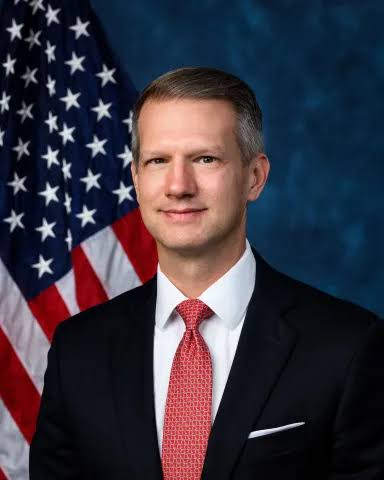When Congressman Riley Moore sat down in Washington, D.C. with Nigeria’s high-level delegation led by National Security Adviser Nuhu Ribadu, two competing stories were in the room.
On one side was Moore’s public claim that Nigeria is guilty of genocide against Christians, a narrative now feeding Donald Trump’s threats of sanctions, “CPC” designation and even military action.
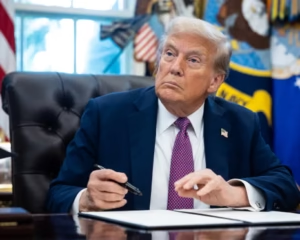
On the other side were Nigerian officials insisting that the country faces a complex security crisis – terrorism, banditry, farmer–herder clashes, criminality – that has claimed the lives of Christians, Muslims and others alike, not a one-direction campaign to exterminate Christians.
The National Patriots Movement (NPM) sits firmly in that second camp. It welcomes dialogue, but it is blunt: no one who has already pronounced Nigeria guilty of “genocide against Christians” should be allowed to run a supposedly neutral investigation unless he is willing to confront the full data, not just advocacy talking points.
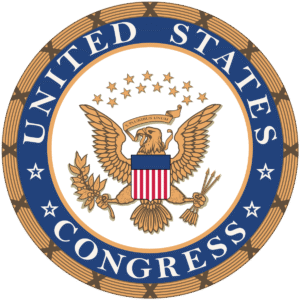
Here is what the numbers – as far as they exist – actually show.
● The overall scale of Nigeria’s violence
First, the reality: Nigeria is bleeding.
The Boko Haram / ISWAP insurgency in the northeast has killed around 35,000 people and displaced more than 2–2.6 million since 2009.
In just the first six months of 2023, more than 3,300 people were killed in political and communal violence nationwide, according to the Council on Foreign Relations’ Nigeria Security Tracker, summarised by Freedom House.
Civil-society casualty tracking (Global Rights’ “Mass Atrocities” project) has repeatedly recorded thousands of violent deaths per year, and a 2020 synthesis cited at least 4,556 Nigerians killed and 2,860 kidnapped in that year alone.
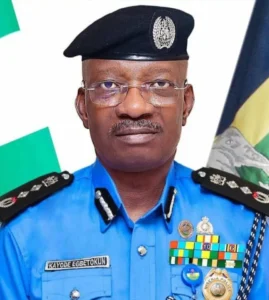
Crucially, Boko Haram is no longer the only or even the main killer everywhere:
Research using ACLED data, summarised in a 2024 UNIDIR / Global Initiative report, shows that in north-west Nigeria “armed bandits” have in recent years killed more Nigerians than Boko Haram, robbers, kidnappers and cult gangs combined.
These are staggering numbers – but they describe a multi-actor war on civilians, not yet a clean, one-direction genocide story.
● Who is dying? Christians, Muslims – and everyone in between
2.1 Boko Haram’s victims: mostly Muslims, not exclusively Christians
A detailed academic study of the “body count and religion in the Boko Haram crisis” found that, despite a very real increase in deadly attacks on Christian civilians, approximately two out of three civilian victims of Boko Haram were in fact Muslims.
The authors also highlight a distortion: Christian victims are over-reported in both Nigerian and international media, while Muslim victims are often under-reported, feeding a simplified narrative of “Islamists killing Christians” and masking the wider civilian toll.
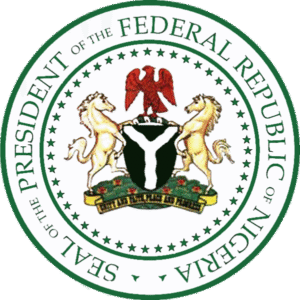
That conclusion is now echoed at the highest continental level:
African Union Commission chair Mahmoud Ali Youssouf has publicly stated that “the first victims of Boko Haram are Muslims, not Christians” and that the situation in northern Nigeria “cannot be described as Christian genocide.”
He went further: “There is no genocide in northern Nigeria” and Washington should “think twice” before throwing around that word.
2.2 Christian persecution is real – and on a shocking scale
The National Patriots are not pretending Christians and Muslims are safe, but Nigerians generally are unsafe with the rising insecurity.
According to Open Doors’ World Watch List 2025, more Christians are killed for their faith in Nigeria than in the rest of the world combined.
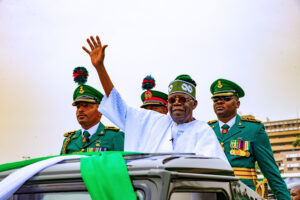
For the reporting year Oct 2022 – Sep 2023, Open Doors estimates 4,118 Christians killed for their faith in Nigeria alone – about 11 per day, accounting for 82% of all believers killed worldwide in that period.
Their analysis also finds that Fulani militant attacks accounted for 55% of recorded Christian deaths between 2019 and 2023, especially in the Middle Belt states.
So, two things are simultaneously true:
● Christians in Nigeria are experiencing extreme, targeted violence in several regions, enough for Nigeria to rank in the top tier of persecution globally.
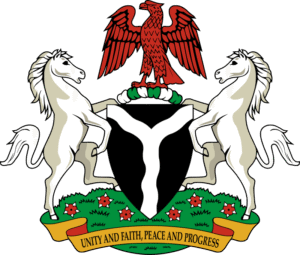
● They are not the only victims. Muslims and other communities are also massacred, kidnapped, raped, displaced – often by the very same groups.
As one recent report on the crisis put it, “everyone is a potential victim, regardless of background or belief.”
Any serious investigation has to hold those two points together. A selective reading of only Christian-focused data is poor analysis and worse policy.
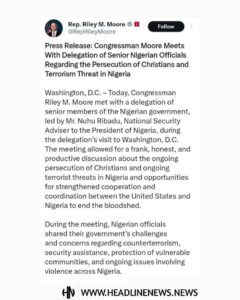
● Where is the killing happening – and by whom?
Northeast: jihadist insurgency
In Borno, Yobe and Adamawa, Boko Haram and its offshoot ISWAP continue to wage a brutal insurgency:
Villages are massacred, such as recent attacks killing 40–57 farmers and villagers in Borno.
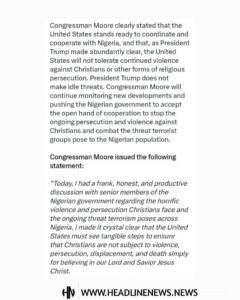
Tactics include suicide bombings, kidnappings, forced marriage, attacks on mosques, churches, markets and schools.
Targets are not chosen solely by faith:
They include Muslim communities accused of “collaborating” with rival factions, moderate imams, traditional rulers, as well as Christian villages, security forces and government institutions.
Northwest: banditry turned mass-atrocity
In Zamfara, Katsina, Sokoto, Kaduna and neighbouring states, so-called “bandits” carry out:
Village raids, mass kidnappings, highway ambushes, cattle rustling and extortion.
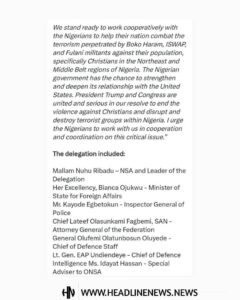
Attacks that have wiped out villages, sometimes killing scores or hundreds in a single operation; one 2022 incident in Zamfara left at least 200 civilians dead.
These groups are often ethnically Fulani, but their motives are largely criminal, not ideological. They prey on whoever is vulnerable – Hausa, Fulani, Christian, Muslim – and profit from collapsing state authority and a booming illicit arms economy.
Middle Belt: land, identity and faith collide
In Plateau, Benue, parts of Kaduna and Nasarawa, farmer–herder conflicts have morphed into chronic mass violence:
A recent attack by suspected Fulani herders on Zike, a predominantly Christian farming village in Plateau State, killed at least 40 people, possibly more than 50, including children and the elderly.
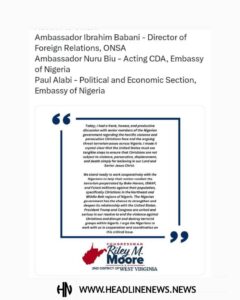
Between December 2023 and February 2024, more than 1,300 people were reported killed in Plateau alone, according to figures cited by local leaders and Amnesty International.
While the religious identity of communities (Muslim herders vs Christian farmers) undeniably fuels the rhetoric and mobilisation, global conflict monitors are clear: the root drivers are land, water, climate stress, demographic pressure and weapons proliferation – then layered with religion and ethnicity.
This is the kind of complexity that a “Christian genocide” slogan simply erases.
● What the data can’t prove – and why “genocide” is a very high bar
There are serious methodological limits:
Many incidents are never reported to press or NGOs.
Most databases do not systematically record the religion of every victim, because that information is often unknown or contested.
Different trackers use different inclusion criteria – some count only insurgency-related deaths, others include criminality, communal clashes or state abuses.
Even with those caveats, the best available research does not support a clear pattern of the Nigerian state orchestrating or tolerating a systematic plan to exterminate Christians as a group – which is what “genocide” means under international law.
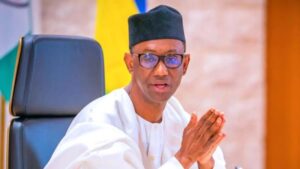
Instead, it points to:
Multi-sided violence, with both Christians and Muslims heavily victimised.
A federal government that is often weak, slow or complicit in some local abuses, but simultaneously fighting Boko Haram, ISWAP and bandits and reporting thousands of militants killed and suspects arrested.
You can criticise Abuja for corruption, impunity or incompetence. But declaring “genocide against Christians” as a settled fact on the basis of partial or faith-specific advocacy data is reckless.
That is exactly what worries the National Patriots.
● The National Patriots Movement’s message to Congressman Moore
The National Patriots Movement accepts three hard truths:
● Christians are being killed for their faith in horrifying numbers.
● Muslims and other communities are also being killed, displaced and terrorised across the country.
● Nigeria cannot tackle this alone; it needs partners.
Their problem is not with a tough U.S. conversation on human rights or religious freedom. Their problem is with a Congressman who has already publicly pronounced Nigeria guilty of “Christian genocide” and is now leading the investigation expected to advise Trump.
From the NPM’s perspective, Moore now faces a simple test:
Will he update his views in light of fuller evidence – the AU’s position that there is no genocide, the academic findings that most Boko Haram civilian victims were Muslims, the data showing multi-actor violence – or will he cling to a pre-packaged narrative that fits U.S. domestic politics?
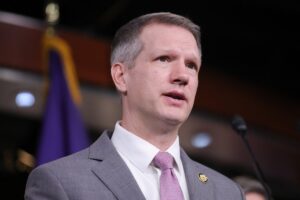
The Movement’s position can be summed up like this:
On framing: Stop reducing Nigeria’s tragedy to a single slogan about Christians. Acknowledge all victims and all perpetrators.
On process: Any investigation must be evidence-driven, transparent and inclusive, not controlled by someone who has already delivered the verdict.
On policy: The way forward is support, not strangulation – intelligence sharing, training, justice-sector support, community-based prevention – not lazy sanctions and threats of military intervention based on shaky “genocide” claims.
Nigeria, they insist, is ready to collaborate. The federal delegation that met Moore has already put data and context on the table: attacks on schools, churches, mosques; massacres of Christian and Muslim communities; soldiers, farmers, women and children all in the line of fire. The ball is now in Washington’s court.
● What a responsible U.S. response would look like
If the United States actually wants fewer dead Nigerians – Christian or Muslim – rather than a convenient talking point, a responsible path looks like this:
Broaden the evidence base: combine Open Doors data with ACLED, Nigeria Security Tracker, Nigerian civil-society casualty tracking, AU and UN analyses. Don’t cherry-pick.
Name all perpetrators by type: jihadist groups, bandits, farmer–herder militias, cult gangs and state abuses – and tailor responses accordingly, not under a single vague label.
Invest in capacity, not just condemnation: support Nigeria in improving intelligence, forensics, prosecutions, victim support and community-level early-warning.
Avoid collective punishment: recognise that sanctions or a crude “CPC + threats” approach risk weakening the very state that still has to fight Boko Haram, ISWAP and bandits.
Keep the door open: turn the Moore–Ribadu meeting into the start of a structured U.S.–Nigeria working group on insecurity, with input from groups like the National Patriots Movement and faith leaders from both sides.

Conclusion.
The violence in Nigeria is bad enough without distortion. Christians are indeed being killed for their faith in numbers that shock the conscience. Muslims and others are being slaughtered as well. The state is struggling – sometimes failing – to protect its citizens.
The numbers do not justify a lazy, one-sentence verdict of “Nigeria is committing genocide against Christians.” They justify something harder: serious, long-term partnership to tackle a complex, national security crisis.
That is the position of the National Patriots Movement. After meeting Nigeria’s delegation and seeing the data, the question is whether Congressman Moore – and those he reports to – are finally prepared to see it too.
Headlinenews.news Special Investigative Report. Washington DC.


